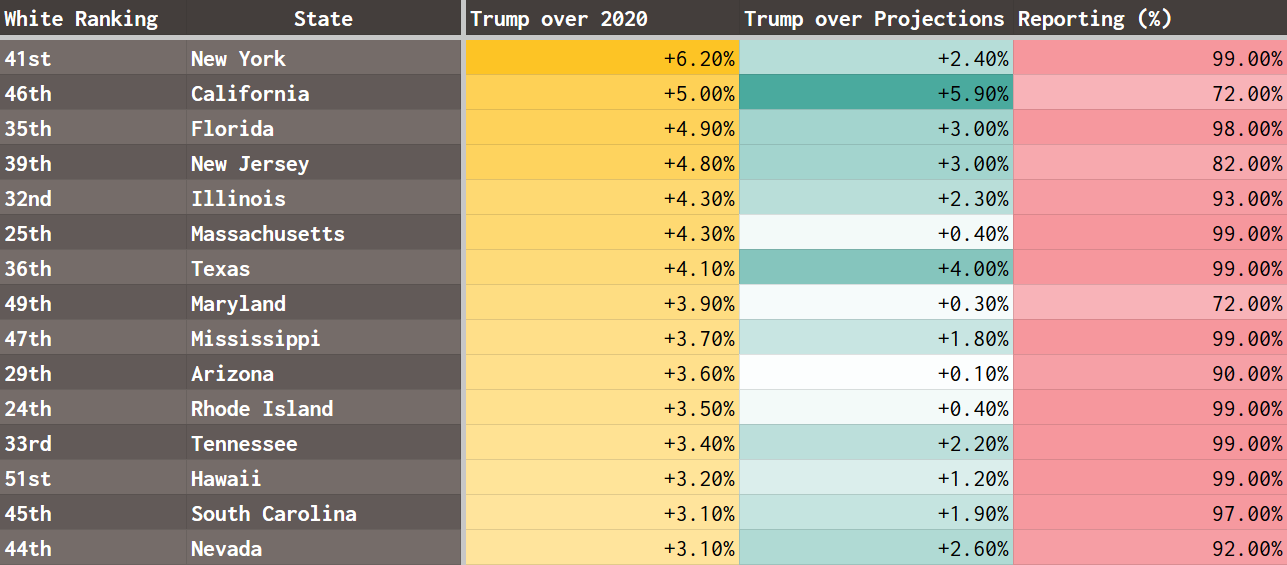Who Elected Donald Trump?
America’s 47th President was elected by a multiracial, populist coalition of non-college educated working-class men. Here’s one of them.
Jackson is a twenty-year-old Black man who lives in Oklahoma. He has a certificate from a vocational technology school for 3-D modeling though, on account of poor prospects in his field, he’s currently unemployed and living in his parent’s house. He spends his days in his room reading and watching YouTube, growing disillusioned with the world. “I'm pretty much just waiting to die,” he said. “I'm not gonna go out because what’s the point? It's not even out of depression, just objective reality.”
While Jackson exists far outside civil society, this year, he became politically engaged. From his cocoon, he has been voraciously consuming information about the world. While he did not vote in 2022, the registered independent felt a strong pull towards the ballot box in 2024. Inspired by Black conservative influencers and men’s rights activists, Jackson became the first person in his family to vote for a Republican for President.
“I voted for Trump, and Kamala quite consistently looked like a bumbling idiot.”
Jackson is one of many millions of Black and Latino men who dropped a ballot in the box for Donald Trump this election. As the New York Times has already observed, Trump saw massive gains among non-white voters this election, gaining more than 13% in Hispanic-majority counties, 10% in Native American majority counties, and nearly 3% in Black-majority counties. These gains have affirmed Trump’s strength in the increasingly diverse states of Florida and Texas, and they’ve made Democrats squirm in New Jersey, New York, and Illinois, where Trump overperformed many election models. Trump’s popularity among young Black and Latino men may well have won him the election in Philadelphia and Detroit, where he won 5% and 10% more votes than in 2020, respectively.

Jackson has been spending a good deal of time thinking about the world and deciding how he would vote in his first Presidential election. He took issue with what he perceived to be the Harris campaign’s excessive social liberalism. “I disliked the identity politics, so much ‘woman this’, ‘white that’, ‘black here’, ‘men there’. It was and still is very tiresome.” To him, the Democratic Party’s messaging this cycle was cynical and condescending. “Kamala's whole campaign, or at least the people around her, were all just shaming men, like when Obama basically called ‘brothas’ pussies for not wanting a woman president,” he said. While he also disdains what he calls “redpill s***”, he understands their grievances. “Sometimes, I watch [redpill content] for the funny TikTok compilations of crazy people and skip the garbage,” he commented. “I don't care what gender [the President] is, heck, I'd vote for Tulsi if she ran. I just don't see what Kamala would've done for America.”
While he acknowledged that he is probably in a social media echo chamber given the overrepresentation of right-wing influencers such as Amir Odom, Amala Ekpunobi, and Lauren Corbett in his feed, he said that he does go out and seek left-leaning content. “It's very hard to sit and listen,” he said, “because 9/10 times, it feels stupid, illogical, and feelings-based instead of factual.” While he did seek Harris’ policies, he said he always found them elusive, and when not elusive, then bad. He fears the expansion of state power, so he dislikes the idea of a tax on unrealized capital gains. He said he’s not sure whether, in all of Harris’ flip-flopping, she had suddenly adopted a reasonable gun policy. “When asked a question about her policies, she would just cite her site,” he lamented. He felt that Trump was always clear about what he believed. “A really big factor was the fact that a clip of Trump stating his policies at a rally showed up on my timeline more than once,” he said. “Trump’s appeal to young men really worked.”
While he doesn’t have any buyer’s remorse yet, he has been disappointed by the response to Trump’s victory that he’s seen on social media. “On Instagram, I’ve seen stories with captions like ‘to all the women-haters out there, f*** you’, ‘every woman lost a part of themselves today’, ‘if you voted for that man, you failed a woman’, and the like” he said. “I’ve been thinking about all the people whose stories I didn’t see, who will think that I’m ‘against them’. Of course, that isn’t the case.”
“The thought that someone I once called a friend, went to school with, and viewed in a positive light could learn I voted for Trump, and in turn dislike and judge me, is not very appealing.”
In the course of the past few days, I have seen arguments in a similar vein peddled by my more left-wing friends, seemingly operating under the assumption that one can be shamed into changing their mind. I have seen arguments that Donald Trump’s election is a direct cause of the suicide of over seven hundred transgender children on the day after the election, that Black men who voted for Trump are race traitors, and that every Trump voter is personally responsible for detrimental effects that a Trump administration will, apparently, inevitably have on the environment, public education, and human rights in America. I’ve seen posts that not only vigorously denounce anyone who supports Trump, but also anyone who believes that their relationships should be valued more than mere politics.
This notion that 51% of Americans are your enemies, and that anyone who disagrees that they are your enemies is also your enemy, is as absurd as it is improbable. Not only are such arguments not convincing, but they are divisive arguments that undermine the philosophical underpinnings of our democracy. If a majority of Americans are so deluded by their racism, misogyny, populism, and love of political theater that they are simply not capable of rationally electing a government, then the whole premise of self-government is flawed. If people are not fundamentally capable of electing their leaders, then we should really go ahead and call it quits on this whole democratic experiment. Our best regards to thee, Constitution, Federalist Papers, and every liberal treatise written in the past 400 years, but you all have it wrong. Man is a slave to his worst instincts, and any government that he creates will act accordingly.
I do not believe that this is true. I believe that, with the information that all the Jacksons of America had at their disposal, they made the decision that appeared best to them. This Jackson voted for Trump because he felt like Harris focused too much on identity rather than on more substantive issues, but another young, working-class Jackson in Detroit could have just easily decided that Trump’s tariffs would support the development of the types of well-paying, unionized jobs that NAFTA displaced. A young Chicano Jackson in Eagle Pass could have decided that he was tired of hearing local news stories about dead migrants’ bodies washing up on the shore of the Rio Grande. A young Cuban Jackson in Florida could have simply been annoyed that average inflation rates under Biden returned to what they were back in the 1980s, and that the Inflation Reduction Act didn’t seem to actually address that real problem.
In 2020, the American public voted 51% in favor of Joe Biden, and this year, they have done the same for Donald Trump. Just as the American public had reason to elect Joe Biden in 2020, so too do they now have reason to elect Donald Trump. While many of us may not agree with our fellow Americans’ reasons, it is reason nonetheless. After four years on the back foot, a multiracial, populist coalition has elected Donald Trump’s Republican Party to resolve America’s ills. For those of you who supported Donald Trump, I hope that you are satisfied with your decision in four years’ time. For those of us who supported Harris in this year’s election, it is now our duty to serve as the loyal opposition: to judge, critique, protest, and debate the merits of this new government, not to destroy it, but to convince it to be better and its supporters to think critically on it.
In what looks like it will be a narrowly divided government, Donald Trump will be hard-pressed to pass his policy proposals through two houses of Congress and avoid getting bogged down in the courts, as happened in his first term. Then, in two years, it will be election time again. In 2018, after two years of an incompetent, embarrassing Trump administration, the Democrats won over 40 additional seats in the House of Representatives and swung the popular vote by over five points. It swept his whole administration out from under him, and it turned him into a lame duck, whose only real achievement thereafter was ramming through court appointees between impeachments.
If those who oppose Trump make the right arguments to appeal to the right people, there is no reason to believe that they cannot disable him again. As this election has shown, even today, Americans can be convinced. If Jackson and all his young, working-class compatriots can be convinced to vote for Trump, I can’t imagine why anyone should be off-limits when imagining who could be convinced to vote against him next time.


